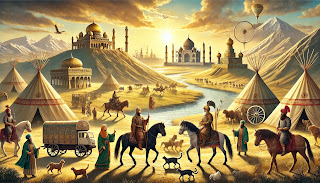By Bobby Darvish, Iranian-American Ex-Muslim, Former Vegan, Former Democrat, Former Socialist, Former CAIR-Columbus Executive Director, Former Muslim Forum of Utah President, Christian Conservative LDS
The Scythians, the ancient Iranic warriors of the late 8th and early 7th centuries BCE, forged one of the most dynamic and innovative empires the world has ever seen. Often overshadowed by later civilizations like the Greeks, Romans, and Persians, the Scythians were far more than mere nomadic horse riders—they were architects of a civilization that spanned the vast Eurasian steppe and influenced the Classical world profoundly.
As an Iranian-American tracing my roots through royal Safavid lineage, I find the Scythian Empire’s history deeply personal. These ancestors were not only warriors but philosophers, cultural pioneers, and unifiers of diverse peoples. Their contributions laid the groundwork for some of the greatest ideas and civilizations in human history. This legacy resonates deeply with my journey from the confines of Islam to the liberating truth of Christianity and the moral grounding of conservative ideals.
The Scythian Empire: Unity Through Innovation
The Scythian Empire at its zenith stretched from Mongolia and ancient China to the Danube River in Europe, encompassing lands that would later birth mighty empires like Persia, India, and China. Their mastery of horse culture and wheeled felt tents made them highly mobile, allowing them to conquer vast territories while retaining their identity. Living symbiotically with nature, they even shared their nomadic lives with cats—a detail that speaks volumes about their blend of pragmatism and humanity.
Their cultural adaptability was perhaps their greatest strength. By marrying local peoples, they created creole cultures that merged Scythian language, dress, and governance with indigenous traditions. This blending of cultures set the stage for the rise of major civilizations, from the Zoroastrian Persians to the Buddhist Indians and the Taoist Chinese. Philosophers like Buddha, Zoroaster, and Laozi emerged from this cultural ferment, all influenced by Scythian ideas and values.
The Scythians and My Iranian Heritage
As someone whose lineage includes the Safavid dynasty—known for unifying Iran and championing Persian culture—I see a reflection of Scythian values in my ancestors. The Safavids were also adept at cultural synthesis, blending Turkic, Persian, and Islamic traditions to forge a distinct Iranian identity. But unlike the Safavids, who embraced Islam, the Scythians stood apart from the monolithic religious ideologies that later defined the Middle East. Instead, their spiritual diversity allowed for the emergence of philosophies that celebrated individual enlightenment and cosmic harmony.
My journey mirrors this Scythian spirit of seeking wisdom across boundaries. Raised as a Muslim, I questioned the doctrines that demanded submission over understanding. Like the Scythians, who spread their ideas across continents, I sought truth in Christianity and found it in the teachings of Jesus Christ. The Scythians’ emphasis on mobility and adaptability echoes in my embrace of new perspectives, whether through my conversion to Christianity or my adoption of conservative values.
The Scythians’ Enduring Influence
The Scythians' contributions were foundational to the political and cultural frameworks of ancient Iran, India, and China. They introduced feudal socio-political structures that balanced central authority with local autonomy—a precursor to the systems seen in the Persian Achaemenid Empire. Their innovative dress and weaponry influenced not only their contemporaries but also the aesthetics of later empires. Most importantly, their philosophical contributions, including Zoroaster’s emphasis on good and evil, inspired the moral underpinnings of Western civilization.
For Iranian-Americans like me, the Scythians offer a reminder of the strength and ingenuity of our ancestors. Their ability to unify disparate peoples while preserving their identity is a powerful lesson for modern times, especially for those of us navigating the dualities of East and West, tradition and innovation, and faith and reason.
A Personal Reflection
As an ex-Muslim, former vegan, and former socialist, I see the Scythian Empire as an allegory for my own transformation. Like them, I have learned to adapt without losing my core identity. As a Christian conservative, I draw inspiration from their legacy of strength, resilience, and philosophical depth. As a Freemason, I admire their dedication to building not only physical empires but also frameworks of thought that endure across millennia.
In embracing the Scythian legacy, I honor the sacrifices of my ancestors—those who resisted oppression, fought for freedom, and laid the foundations of civilizations. For those of us who trace our lineage to this remarkable empire, the Scythians are not just historical figures but living symbols of our potential to unite, innovate, and inspire.
Citations
Beckwith, Christopher I. The Scythian Empire. Princeton University Press, 2023.
https://press.princeton.edu/books/paperback/9780691237831/the-scythian-empireSulimirski, Tadeusz. The Scythians. Thames and Hudson, 1970.
Di Cosmo, Nicola. "The Northern Frontier in Pre-Imperial China." The Cambridge History of Ancient China, edited by Michael Loewe and Edward L. Shaughnessy, Cambridge University Press, 1999.
Kivisild, Toomas, et al. "The Genetic Heritage of the Earliest Settlers Persists in Iranian and Indian Populations." American Journal of Human Genetics, vol. 70, no. 1, 2002, pp. 270–281.
Rezakhani, Khodadad. "Scythians and the Origins of Persian Identity." Iranian Studies Journal, vol. 48, no. 1, 2015, pp. 1–20.


No comments:
Post a Comment